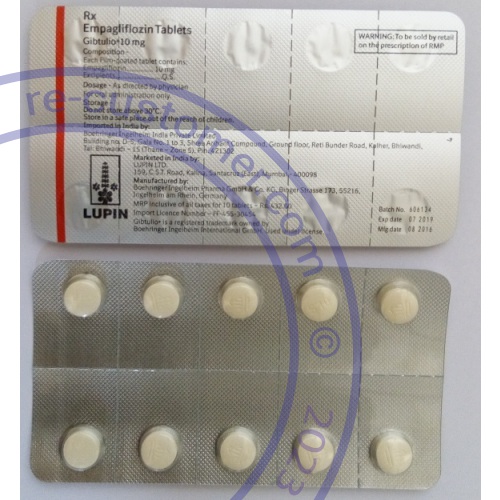- Trusted Tablets
- Diabetes
- Jardiance

Brand(s): Gibtulio
Manufacturer: Lupin
Disease(s): Type 2 Diabetes Mellitus
| Package | Price | Per tablet | Savings | Order |
|---|---|---|---|---|
| 10mg × 90 tablets | $ 494.95 | $ 5.50 | $ 89.90 | Add to cart |
| Free AirMail shipping | ||||
| 10mg × 60 tablets | $ 359.95 | $ 6.00 | $ 29.95 | Add to cart |
| Free AirMail shipping | ||||
| 10mg × 30 tablets | $ 194.95 | $ 6.50 | Add to cart | |
| Free AirMail shipping | ||||
| Package | Price | Per tablet | Savings | Order |
|---|---|---|---|---|
| 25mg × 60 tablets | $ 419.95 | $ 7.00 | $ 29.95 | Add to cart |
| Free AirMail shipping | ||||
| 25mg × 30 tablets | $ 224.95 | $ 7.50 | Add to cart | |
| Free AirMail shipping | ||||
Empagliflozin tablets
What is this medicine?
EMPAGLIFLOZIN is an oral diabetes medicine that helps control blood sugar levels. Empagliflozin works by helping the kidneys get rid of glucose from your bloodstream.
Empagliflozin is used together with diet and exercise to improve blood sugar control in adults with type 2 diabetes mellitus.
Empagliflozin is also used to lower the risk of death from heart attack, stroke, or heart failure in adults with type 2 diabetes who also have heart disease.
Empagliflozin is not for treating type 1 diabetes.
What should I tell my health care providers before I take this medicine?
You should not use empagliflozin if you are allergic to it, or if you have:
-
kidney disease (or if you are on dialysis); or
-
if you are in a state of diabetic ketoacidosis (call your doctor for treatment with insulin).
To make sure empagliflozin is safe for you, tell your doctor if you have:
-
kidney disease;
-
congestive heart failure;
-
low blood pressure;
-
high cholesterol levels;
-
urination problems;
-
a history of bladder infections;
-
if you are on a low salt diet; or
-
if you are 65 or older.
It is not known whether empagliflozin will harm an unborn baby. Tell your doctor if you are pregnant or plan to become pregnant.
It is not known whether empagliflozin passes into breast milk or if it could harm a nursing baby. You should not breast-feed while using this medicine.
How should I use this medicine?
Empagliflozin is usually taken once per day in the morning. Follow all directions on your prescription label. Your doctor may occasionally change your dose to make sure you get the best results. Do not take this medicine in larger or smaller amounts or for longer than recommended.
You may take empagliflozin with or without food, but take it the same way each time.
You may have very low blood pressure while taking this medication. Call your doctor if you are sick with vomiting or diarrhea, or if you are sweating more than usual.
Your blood sugar will need to be checked often, and you may also need to test the level of ketones your urine. Empagliflozin can cause life-threatening ketoacidosis (too much acid in the blood). Even if your blood sugar is normal, contact your doctor if a urine test shows that you have ketones in the urine.
Low blood sugar (hypoglycemia) can happen to everyone who has diabetes. Symptoms include headache, hunger, sweating, irritability, dizziness, nausea, fast heart rate, and feeling anxious or shaky. To quickly treat low blood sugar, always keep a fast-acting source of sugar with you such as fruit juice, hard candy, crackers, raisins, or non-diet soda.
Your doctor can prescribe a glucagon emergency injection kit to use in case you have severe hypoglycemia and cannot eat or drink. Be sure your family and close friends know how to give you this injection in an emergency.
Also watch for signs of high blood sugar (hyperglycemia) such as increased thirst or urination, blurred vision, headache, and tiredness.
Blood sugar levels can be affected by stress, illness, surgery, exercise, alcohol use, or skipping meals. Ask your doctor before changing your dose or medication schedule.
This medicine can cause positive results with certain lab tests for glucose (sugar) in the urine. Tell any doctor who treats you that you are using empagliflozin.
Empagliflozin is only part of a treatment program that may also include diet, exercise, weight control, blood sugar testing, and special medical care. Follow your doctor's instructions very closely.
Store at room temperature away from moisture and heat.
What may interact with this medicine?
Tell your doctor about all medicines you use, and those you start or stop using during your treatment with empagliflozin, especially:
-
blood pressure medicine;
-
a diuretic or "water pill";
-
insulin or other oral diabetes medications; or
-
NSAIDs (nonsteroidal anti-inflammatory drugs)--aspirin, ibuprofen (Advil, Motrin), naproxen (Aleve), celecoxib, diclofenac, indomethacin, meloxicam, and others.
This list is not complete. Other drugs may interact with empagliflozin, including prescription and over-the-counter medicines, vitamins, and herbal products. Not all possible interactions are listed in this medication guide.
What side effects may I notice from this medicine?
Get emergency medical help if you have signs of an allergic reaction: hives; difficult breathing; swelling of your face, lips, tongue, or throat.
Call your doctor at once if you have:
-
a light-headed feeling, like you might pass out;
-
frequent urge to urinate;
-
swelling, rapid weight gain, little or no urinating;
-
dehydration symptoms--feeling very thirsty or hot, being unable to urinate, heavy sweating, or hot and dry skin;
-
ketoacidosis (too much acid in the blood)--nausea, vomiting, stomach pain, confusion, unusual drowsiness, or trouble breathing;
-
signs of a bladder infection--pain or burning when you urinate, urine that looks cloudy, pain in pelvis or back; or
-
signs of a genital infection (penis or vagina)--pain, burning, itching, rash, redness, odor, or discharge.
Older adults may be more likely to have side effects from this medicine.
Common side effects may include:
-
bladder infection; or
-
genital infection.
This is not a complete list of side effects and others may occur.
What should I watch for while using this medicine?
Avoid getting up too fast from a sitting or lying position, or you may feel dizzy. Get up slowly and steady yourself to prevent a fall.

Can i help you?



